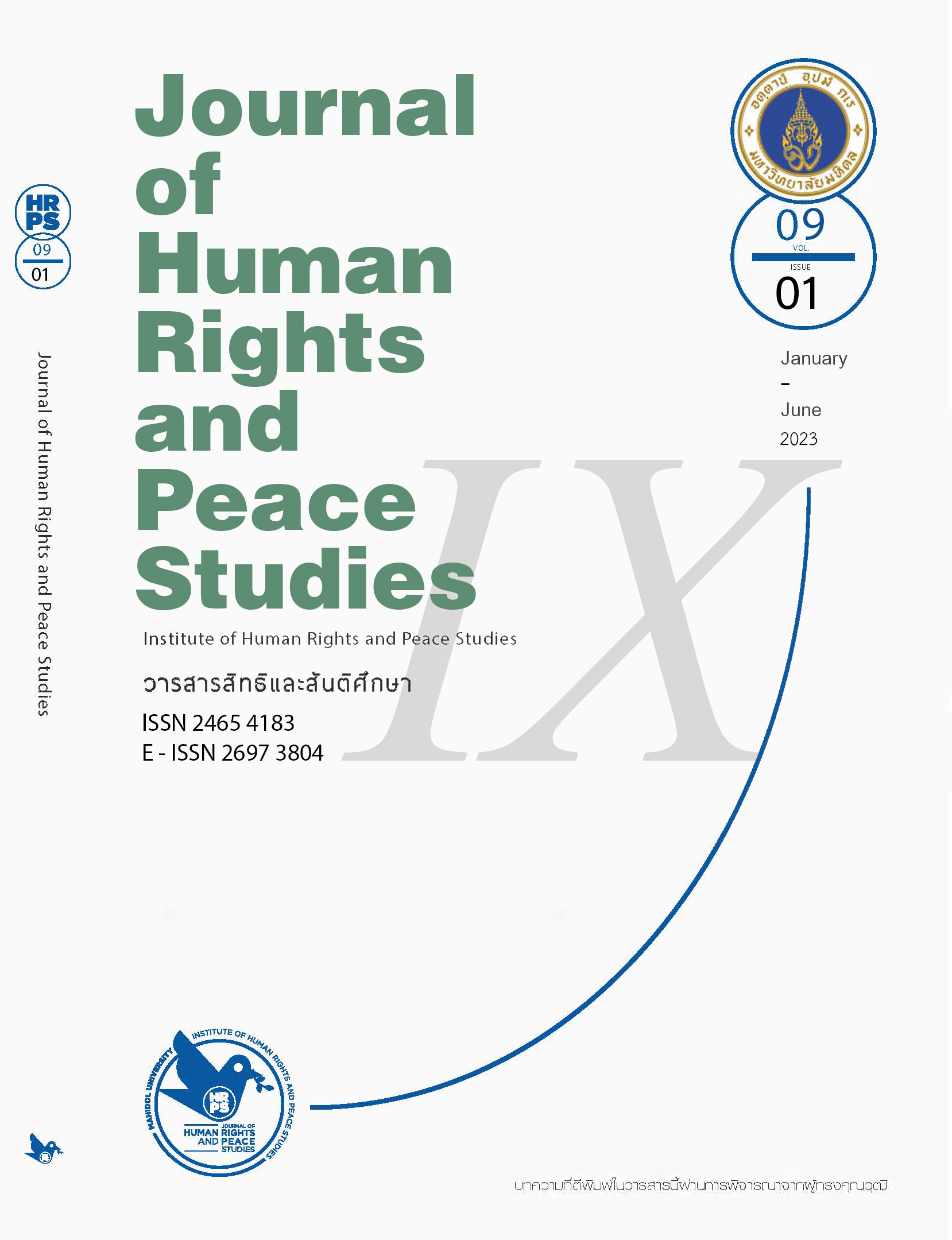The interests of the nation's superpowers related to the conflict between Palestine and Israel
Main Article Content
Abstract
This study aims to examine the historical background of the conflict between Palestine and Israel and investigate the underlying motives and overlapping benefits of hegemonic powers that provide support and assistance in the conflict between the two countries. The research methodology utilized in this study is documentary research, which includes textbooks, academic articles, and internet sources. The collected data is analyzed and synthesized to reveal that the historical origins of the conflict between Palestine and Israel are influenced by various factors, such as beliefs rooted in historical records and the religious significance of the land. Additionally, another significant factor stems from the efforts of Zionist organizations, which played a crucial role in promoting the intervention of hegemonic powers and ultimately led to the establishment of the State of Israel. Regarding the background and overlapping benefits of hegemonic powers, it is found that controlling the strategic waterways in the region is a key objective, as it serves as a vital route connecting Europe and Asia. International organizations, such as the United Nations, also play an essential role in mediating and seeking resolutions to the ongoing conflict. Furthermore, Arab regional organizations are involved in supporting the demands for justice and advocating for the rights of Palestinian residents in the area. They also seek cooperation with the United Nations to alleviate the conflict between the two countries.
Article Details

This work is licensed under a Creative Commons Attribution-NonCommercial-NoDerivatives 4.0 International License.
The views, opinions, and pictures expressed in this journal are those of the authors and do not necessarily reflect the opinions and viewpoints of the editor and the editorial board. All rights are reserved by the authors and the Institute of Human Rights and Peace Studies of Mahidol University. No part of this journal may be reproduced, stored in a retrieval system, or transmitted in any form or by any means without the prior permission in writing from the journal’s editor, or as expressly permitted by law, or under terms agreed with the appropriate reprographics rights organization. Non-commercial use of information in this journal must be properly referenced.
References
Amorntat, K. (1989). Wikrittakān nai tawanʻō̜k klāng kō̜ranī phiphāt pā lēt tai - ʻit rā ʻē lō̜ [Crisis in the Middle East in the case of the Palestinian-Israel dispute]. Odianstore Press.
Aree, M. (2018). Dōnan sam kap lōk Mutsalim : Čhāk nayōbāi sū kān patibat læ phonlap [Donald Trump and Muslim world: from policy to practice and consequences]. Pimdee Co., Ltd.
Benraad, M. (2014, July 21). France’s fascination with Israel and Palestine. European Council on Foreign Relations. https://ecfr.eu/article/commentary_frances_fascination_with_israel_and_palestine290
Bhumiwat, P. (2016). Lōhit ʻit rā ʻē lō̜ [The promised land]. The Post Publishing Company. [In Thai].
Brandenburg, R. (2010, October 13). Iran and the Palestinians. The Iran Primer. https://iranprimer.usip.org/resource/iran-and-palestinians
Cooley, J. K. (1979). Iran, the Palestinians, and the Gulf. Foreign Affairs, 57(5), 1017–1034. https://www.jstor.org/stable/20040269?origin=crossref
Deitch, M. & Valensi, C. (2020). Violent conflicts in the Middle East : A quantitative perspective. Strategic Assement, 23(1), 20–39. https://www.researchgate.net/profile/Mora-Deitch/publication/339237945_Violent_Conflicts_in_the_Middle_East_A_Quantitative_Perspective/links/5f744b79a6fdcc00864886a2/Violent-Conflicts-in-the-Middle-East-A-QuantitativePerspective.pdf? origin=publication_detail
Egypt Today. (2019, June 23). Arab states pledge $100 million monthly to Palestine. https://www.egypttoday.com/Article/1/71997/Arab-states-pledge-100-million-monthly-to-Palestine
Feuer, S., & Zilber, N. (2018, November 16). What happened to Arab support for the Palestinians. https://www.washingtoninstitute.org/policy-analysis/what-happened-arab-support-palestinians
Hiranburana, S. (2018). Thritsadī san sāng niyom (Khwāmsamphan rawāng prathēt) [The theory of Constructivism (inter-country relationships)]. https://www.geocities.ws/drsupreecha/page17.html
Khoury, S. (2019). Who does France support in the Israel-Palestine conflict?. Quora. https://www.quora.com/ Who-does-France-support-in-the-Israel-Palestine- conflict
Mangkang, H. (2017). Yutthasāt khō̜ng prathēt mahāʻamnāt kap khwāmmankhong nai phūmiphāk ʻĒchīa tawanʻō̜k chīang tai : Phākphư̄n thāng thritsadī [The strategy of the major power country for security in the Southeast Asian region]. Naval Strategic Studies Journal, 85(1), 82–89. https://www.navedu.navy.mi.th/stg/tnssc/pdf/83-ys.pdf. [In Thai].
Neeto, T. (2021). Which countries support Israel in the Israel- Palestine conflict?. Quora. https://www.quora.com/Which-countries-support-Israel-in-the-Israel-Palestine-conflict
Panaspornprasit, C. (2018). Phūmiphāk tawanʻō̜k klāng nai kānmư̄ang lōk : Khwām tō̜ nư̄ang læ khwām plīanplǣng [Middle East region in world politics : Continuity and Changed]. Chulalongkorn University Press. [In Thai].
Phungern, S. (2015). Panhā pā lēt tai læ kān raprō̜ng pā lēt tai tām kotmāi rawāng prathēt [Questions of Palestine and Palestine's statehood recognition in accordance with international law]. [Master’s thesis, Thammasat University]. https://digital.library.tu.ac.th/tu_dc/frontend/Info/item/dc:91867
Rabbani, M. (2020, September 1). Palestine and the Arab world: A relationship in crisis?. [Video] YouTube. https://youtu.be/Uj-MPJg4eSY
Redd, K. (2021, July 14). The complex history of the Israel-Palestine conflict. abc10. https://www.abc10.com/article/news/community/race-and-culture/need-to-know-the-israel-and-palestine-conflict/103-79ca68a9-31c4-4adb-9b74-99e26b16cebf
Reuters. (2007, June 20). TIMELINE: Key events since 2006 Hamas election victory. Reuters. https://www.reuters.com/article/us-palestinians-timeline-idUSL1752364420070620
Roberts, W. (2021). Why is the US unequivocal in its support for Israel? https://www.aljazeera.com/news/2021/5/18/short-answer-why-is-the-united-states-so-pro-israel
Spiro, R. K. (2020). History crash course #19: King Solomon. https://aish.com/48937102/.
Sukanit. (2002). Phlœ̄ng khǣn tawanʻō̜k klāng bō̜kœ̄t kān kō̜kān rāi [Middle East fire cause of terrorism]. Dokya Academic Press Co., Ltd. [In Thai].
Tangtrongpairoj, S. (2021, 18 August). Asian development. [Paper presentation]. Institute of Asian Studies, Chulalongkorn University.
Tastekin, F. (2021, June 14). Turkey’s muddled approach to Palestine. Al-Monitor. https://www.al-monitor.com/originals/2021/06/turkeys-muddled-approach-palestine
Yama, A. (2021, September 8). Contemporary Middle East crisis. [Paper presentation]. Institute of Asian Studies, Chulalongkorn University.
Ziadah, R. (2021, June 13). British backing for Israel helps to sustain the unbearable status quo. The Guardian. https://www.theguardian.com/commentisfree/2021/jun/13/british-backing-israel-unbearable-status-quo-palestinians


